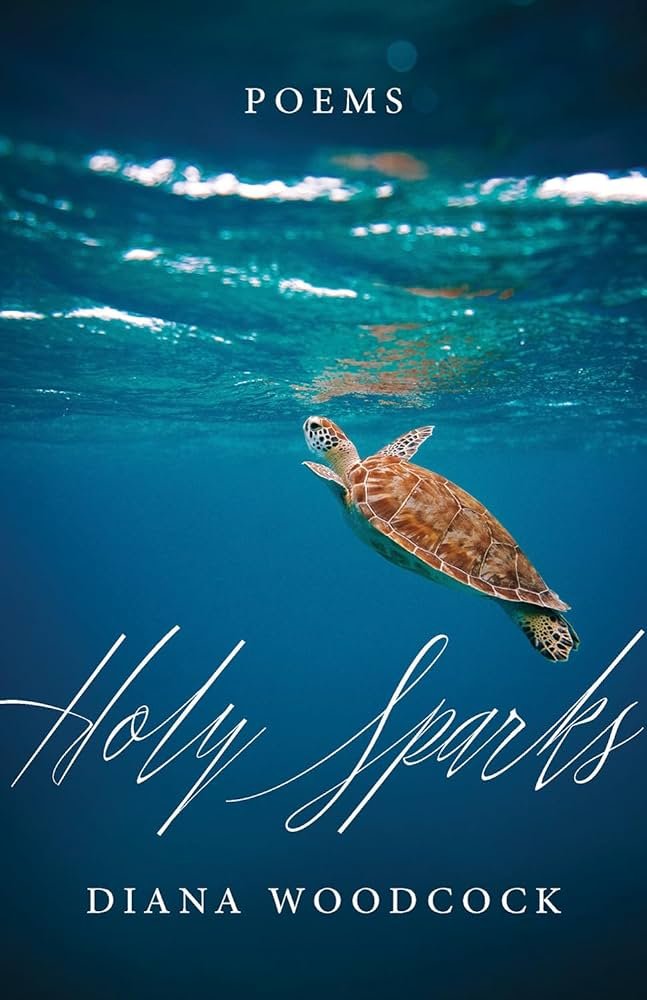Diana Woodcock’s Holy Sparks is an ecopoetic and spiritual tour de force. In this astonishing collection, the poet calls us to renew our covenant with creation (and Creator) as she travels the planet, observing beauty and brokenness with the eyes of a naturalist, the heart of a mystic, and the cry of an ancient prophet. At times elegiac, at times ecstatic, these poems invariably command our attention, inviting us to inhabit our world more deeply, and live in kinship with all creation.
Woodcock’s poems express not simply an affinity for the natural world, but a nondualistic identification – a radical interbeing with other species (birds, camels, elephants)- marked by moments of startling mystical experience and recognition that “all life is one.” She has an extraordinary talent for observing minute manifestations of life (an atom, mollusk, or single grape), then zooming out to traverse the planet from Arabia to Siberia, from the Tongass of Alaska to the Everglades. Hers is powerful poetry of place in a world made of “primordial love.”
If Woodcock’s world is one of companionship with kindred species whom she calls “my mentors,” she converses equally with a wide range of mystics, poets, and prophets. Here we encounter the words of Merton, Eckhart, and Julian of Norwich; Rachel Carson, Gandhi, and Albert Schweitzer; Whitman, Dickinson, and Dostoevsky; Rumi and Rilke, the Bible and Tao Te Ching. With Woodcock and her myriad teachers and saints - and in solidarity with indigenous peoples around the world - we (re)discover our place in the great “liturgy of the cosmos.”
Holy Sparks will engage readers of poetry, travel, and nature writing, and those on the contemplative-activist journey. These poems invite us to a ancient/new way of seeing and being– stillness, attention, being “alive right where we are” – and to an environmental ethic of “ruthless compassion,” resistance to the “global appetite for more,” a steadfast commitment to “hurt not the earth,” and a conviction that “everything/ merits deliverance.” With the poet, we grieve the realities of ecocide, yet still find the courage to “shout and howl/ Hallelujah!'' at the miraculous resurrections that surround us. Never sanguine about the planetary perils we face, Woodcock confronts the darkness - “broods over the void”- and arrives at a hard-won hope rooted in love and creation itself: “Lofty as love, hope looks at absolute/contradiction – life, death –/and pronounces a benediction.”
With Holy Sparks, Diana Woodcock claims a place among the great ecopoets and spiritual writers of our day. A cri de coeur from a hurting planet and a balm for the soul in times of trouble, these poems challenge us, with Julian of Norwich, to “dare still believe [that] all shall be well.”
Alexander Levering Kern is a widely published poet, writer, and editor. A Quaker chaplain and interfaith community organizer, Alex serves as the founding Executive Director of the Center for Spirituality, Dialogue, and Service and founding co-editor/publisher of Pensive: A Global Journal of Spirituality & the Arts (pensivejournal.com), both based at Northeastern University in Boston. Author of forthcoming collections of poems from Cervena Barva Press and Shanti Arts Publishing, Alex is also editor of the anthology Becoming Fire: Spiritual Writing from Rising Generations. His poems appear in Spiritus, CONSEQUENCE online, The Journal of the American Medical Association (JAMA), About Place Journal, Spare Change News, Ibbetson Street, Soul-Lit, and elsewhere. His interfaith peace and social justice work been covered by the Washington Post, Boston Globe, Harvard Gazette, and other media, and has taken him to post-earthquake Haiti, rural Honduras, post-apartheid Southern Africa, peacemaking communities in northern Nigeria, and on interfaith pilgrimages with students to the Arizona-Mexico borderlands and from Selma, Alabama to St. Louis/Ferguson, Missouri in 2015.
Ping Zhu’s illustrations, with their distorted perspective, cartoonish drawings, and expansive, colorful stretches of empty space, would grab the attention of a four to nine year old, the age group that both picture books and easy readers target.
Read More
Alzanaur’s story celebrates the beauty of strangeness, affirming a truth every child (and adult) instinctively knows, and Ping Zhu’s illustrations make that beauty fully present to the reader in her captivating depictions of children, books, and birds of several kinds.
Read More
My favorite poetry texts of 2020 offered places to burrow into comfort without entering echo chambers. They charged through the overgrowth, clearing any number of paths I wished to take—through rage, sorrow, and desire to somewhere resembling peace and affirmation.
Read More
Charity Gingerich's debut collection of poetry is a case study in rhythms. The poems are filled to bursting with landscapes and choral hymns, while the poet's own internal rhythms pulse and hum just below the surface. The tension between these interior and exterior worlds, and the struggle to keep their rhythms in sync, form the emotional core of After June.
Read More
I have recommended this book to so many people for two reasons: Peterson’s reclamation of evangelical ideas, and her advocacy of women. She unblinkingly tackles evangelical failings: race, sexuality, indigenous rights, and poverty, to name a few.
Read More
Somewhere along the way, we have come to believe that a poet’s natural habitat is a coffee shop where—maintained and caffeinated by well-trained baristas—he can brood in private and pace his mind in tiny circles without breaking free to harm the general populace. So when Mr. Webster came to town, it seemed only fitting—however stereotypical—to meet him where he might feel most at home and discuss his latest poem: “The Solemn Sea.”
Read More
Wolfe elicits the praise of other novelists because he wields the powers they prize most, both as readers and fellow craftspeople: subtlety, complexity, a virtuosic handling of language, all married to a control that focuses the laser of his genius into the cutting of something greater than the sum of its parts. I suspect writers of speculative fiction love him with a special love because he is both the instantiation and justification of their much-maligned subculture.
Read More
The Book of Kells, winner of Poetry by the Sea’s 2018 Best Book Award, by acclaimed poet Barbara Crooker is her most luminous, multi-layered collection yet. Granted two writing fellowships at the Tyrone Guthrie Centre in Annaghmarkerrig, Ireland, Crooker spent time there researching, observing, and writing about the ancient, illuminated manuscript.
Read More
Kevin Morby’s fifth studio album, Oh My God, begins with the sound of an upright piano, past its prime—the kind you find in church backrooms, probably donated and used mostly to accompany Sunday school songs. He plays a flurry of clustered, bluesy notes up and down the keyboard before settling in on the chords, hammered out in steady quarter notes. It’s a good opening for an album, evoking a moment when sporadic musical noodling suddenly, as if through unknown inspiration, coalesces into song. I first listened to Oh My God the day my wife’s great aunt died. After the piano introduction, Morby starts singing a repetitive, “Oh my Lord, come carry me home.” It seemed appropriate. Perhaps more than coincidental.
Read More
The “[h]oly body and slave body act the same,” says American scholar Willie James Jennings in his award-winning book, The Christian Imagination: Theology and the Origins of Race. In his extensive study, he explores the connection between western colonists’ Christianity and their creation of the social construct of race—and how its long legacy distorts the “vision of creation.” As Ta-Nehisi Coates says in Between the World and Me, “This legacy aspires to the shackling of black bodies. It is hard to face this. But all our phrasing—race relations, racial chasm, racial justice, racial profiling, white privilege, even white supremacy—serves to obscure that racism is a visceral experience, that it dislodges brains, blocks airways, rips muscle, extracts organs, cracks bones, breaks teeth.”
Read More
As one who’s taught in Christian Higher Education for decades, I’ve experienced both healthy and hostile environments. The hostile culture allowed no one to question the authority of the leaders, who bullied employees, purged those viewed as too liberal, and of course, mandated women exercise their voices only in the most submissive and modest manner imaginable.
Read More
Every once in a while, a writer beautifully expresses the human longing for illumination, causing the reader to sit still for a moment, unable to jump right up and re-enter the everyday world. Hannah Faith Notess offers this experience in her collection of poems, The Multitude.
Read More
Ours has been called the age of literary memoir. Though I roll my eyes at grandiose words like age—predictably so since ours is also, we are told, an age of irony—I am convinced there is substance to this claim. Memoir, and its umbrella category creative nonfiction, belongs to us in the way the doorstop novel belonged to the Victorians.
Read More
Mischa Willett begins his first book of poems, Phases, behind a lectern—a dusty word that conjures the professor or the preacher, either of which would be appropriate here. And from this lectern, Willett’s pastor/shepherd calls the whole human race—readers, speaker, writer, all—“sheep.” And not the adorable, acceptable sheep of the safe and precious metaphor we’re sometimes comfortable placing on children. No, we are all the sheep Andre Dubus describes in “Out Like a Lamb”: “stupid, helpless brutes” who “without constant watching . . . would foolishly destroy themselves.”
Read More
Writing in her late twenties, Meghan Florian is not quite writing from middle-age, or from a mid-life crisis. So what does it mean to her to be in “the middle of things?” The second essay in this slender collection, “What about Breakfast at Tiffany’s?” contains the line for which the book is named, and helps illuminate the place from which Florian writes.
Read More
John Matthew Fox's short story collection, I Will Shout Your Name, looks at missionaries and people of faith from an unexpected perspective – their flaws. Doubt and faith, hesitation and commitment, love and hate all mingle together to create complex characters which initially left me uncertain how to understand the collection as a whole. As I continued reading, connected themes and repeated questions began to emerge.
Read More
Amy Peterson reflects on the two years she worked overseas in her memoir Dangerous Territory with care and vulnerability. As part of her graduate studies, she went to Southeast Asia to teach English and quietly share the gospel. What followed disassembled everything she though she knew.
Read More
Katie Manning's poetry collection, Tasty Other, is an honest, clever, and complex reflection on pregnancy and motherhood. As a single woman in my 30s, the majority of my female friends are moms. "Motherhood changes you," they say. I nod, seeing this truth play out in front of me, but never really understanding their meaning. Manning’s poems invite me to a deeper empathy with all that my mom-friends experience.
Read More
Josh MacIvor-Andersen’s thoughtful memoir, On Heights & Hunger, wrestles with faith, fear, and desire. His intellectual and spiritual wondering is grounded by concrete moments and honestly rendered individuals.
Read More

